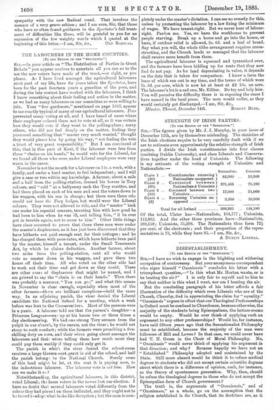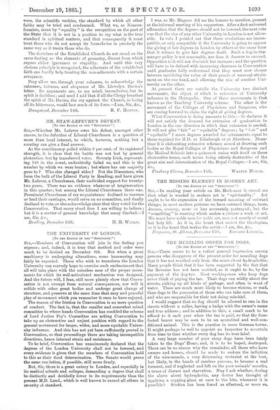DISESTABLISIIMENT.
[To THE EDITOR OF TEE " SPECTATOR."]
SIR,—I have no wish to engage in the blighting and withering occupation of controversy. But your anonymous correspondent who signs himself " Oxoniensis " concludes his letter with a triumphant question,—" Is this what. Mr. Horton wants, or is he beating the air ?" 1 is only fair to myself and to him to say that neither is this what I want, nor am I beating the air.
But the concluding paragraph of his letter affords a fair illustration of the difficulty which even Liberals who are of the Church, Churchy, find in appreciating the claim for " equality." "Oxoniensis " argues in effect that our Theological Professorships in Oxford must be confined to 'Churchmen, because-otherwise, the majority of the students being Episcopalians, the lecture-rooms would be empty. Would he ever think of applying such an argument to any other professorships ? Would he, for instance, have said fifteen years ago that the Sensationalist Philosophy mast be established, because the majority of the men were followers of Mill and Lewes In that case, we could never have had T. H. Green in the Chair of Moral. Philosophy. No, " Oxoniensis" would never think of applying his argument in that direction ; and why? Because happily we have not an " Established " Philosophy adopted and maintained by the State. Still more absurd, would he think it to refuse medical degrees to students who did not accept certain scientific dogmas about which there is a difference of opinion, such, for instance, as the theory of spontaneous generation. Why, then, should be refuse the theological degrees to those who do not accept the Episcopalian form of Church government ?
The truth is, the arguments of " Oxoniensis," and of " Oxonienses," as a whole, go on the assumption that the religion established is the Church, that its doctrines are, as it were, the scientific verities, the standard by which all other faiths may be tried and condemned. What we, as Noncon- formists, mean by " equality " is the recognition on the part of the State that it is not in a position to say what is the true standard in spiritual matters, and that consequently it must treat those who do not accept its formularies in precisely the same way as it treats those who do.
The doctrines of the Established Church do not stand on the same footing as the elements of geometry, dissent from which -argues either ignorance or stupidity. And until this very obvious principle is recognised, the adherents of the established faith can hardly help treating the non-adherents with a certain arrogance.
Pray allow me, through your columns, to acknowledge the -calmness, fairness, and eloquence of Mr. Llewelyn Davies's letter. Its arguments are, to my mind, inconclusive, but its spirit is faultless ; and need I add that if all the Clergy breathed the spirit of Mr. Davies, the cry against the Church, in losing all its bitterness, would lose much of its force.—I am, Sir, &c.,











































 Previous page
Previous page